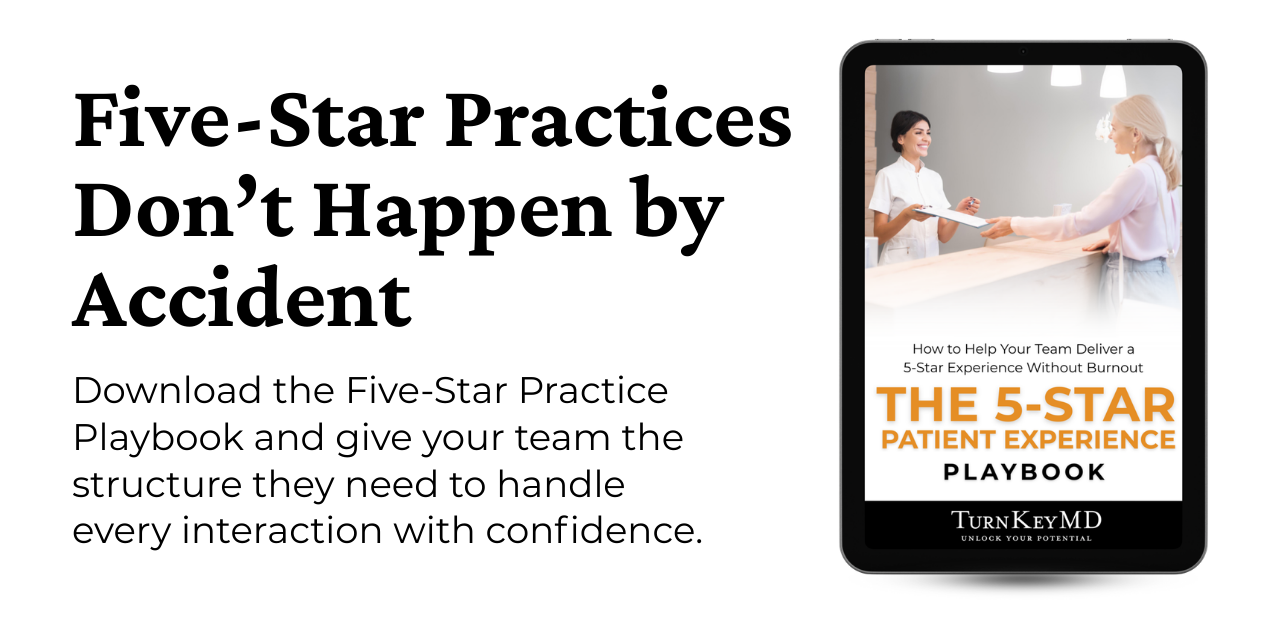Stronger Managers = Stronger Practices. Here’s Why.
Feb 14, 2025
Does your practice feel a little chaotic sometimes? You’re not alone. Each week in Calm the Chaos, I’ll share actionable strategies, real-world stories, and simple tech solutions to help you take control and create a better experience for your patients and team.
This week’s newsletter is a little longer than usual, but for good reason. If you want your practice to run more efficiently and your team to operate at a higher level, investing in your practice manager’s leadership skills is essential.
A strong manager doesn’t just keep things running—they drive team performance, improve patient experience, and create a work environment that retains top talent. But without the right training, many practice managers operate with blind spots they don’t even realize they have.
Today, I’m breaking down:
- A real-world example of how one practice manager turned things around
- Four actionable ways you can empower your manager this week
- The importance of leadership development and a must-read book recommendation
Let's dive in!
STORY TIME:
How Training Transformed Sally’s Leadership and Her Practice
BEFORE THE FIX:
Sally was a dedicated practice manager in a small town outside of Phoenix, Arizona. She had been with the practice for 22 years, working her way up from front desk receptionist to medical assistant, then to billing, and eventually into management.
But despite her experience, Sally struggled with staff turnover and couldn’t get everyone on the same page. She was constantly stressed because she had never received formal leadership training—she was doing her best with what she knew, but she didn’t have a clear framework to guide her.
Sally was working in a silo, relying on what she had learned within the walls of her own practice. The problem? She didn’t know what she didn’t know.
She had blind spots—critical areas of leadership, team management, and practice operations that she had never been exposed to because she had never received structured training.
THE SOLUTION
Sally attended a structured training designed specifically for practice managers. For the first time, she had:
- A clear roadmap for managing her team effectively.
- Proven frameworks to fall back on when challenges arose.
- Coaching skills that helped her get her team back on track.
- Confidence in leading with clarity instead of reacting under stress.
As she learned new leadership principles, she realized just how much she had been missing all along—things she didn’t even know she needed to know.
THE RESULTS
- Staff turnover decreased because employees felt more supported.
- The team started communicating better and working together more efficiently.
- The practice ran more smoothly, leading to better patient experiences.
- Sally went from constantly overwhelmed to calm, focused, and in control.
She finally had the tools she needed to lead with confidence—and she was no longer operating with blind spots.
ACTIONABLE TIPS FOR THE WEEK
How to Empower Your Practice Manager with Continuing Education
- If you aren’t growing, you’re dying. Your practice manager needs a lifeline—a place to receive real-world support and ongoing education. Without continuous growth, they risk operating in survival mode instead of leading with confidence.
- Don’t rest on your laurels. If your practice isn’t innovating with tech and tools to improve efficiency, you’re leaving revenue on the table. A well-trained manager knows how to implement better systems, optimize workflows, and help your practice grow.
- Invest in both virtual and in-person training. A combination of self-paced learning and live training helps managers retain information, stay motivated, and improve both their morale and confidence.
- Get your manager in a room with other managers. Something powerful happens when practice managers connect with their peers—they share resources, work through problems, and exchange golden nuggets of information. This kind of collaboration leads to breakthroughs that wouldn’t happen in isolation.
TANIA'S TECH TIPS:
The Best Ways for Managers to Learn & Grow
- Use self-paced training to fit learning into a busy schedule. Managers are pulled in a hundred different directions every day. That’s why on-demand training is one of the best ways for them to stay sharp without disrupting patient care. Short, structured courses allow them to learn at their own pace and immediately apply what they’ve learned.
- Tap into online communities for support and fresh ideas. Many practice managers feel like they’re on an island, dealing with challenges on their own. Private online communities and Facebook groups offer a space to share insights, problem-solve, and get real-world advice from others who understand the day-to-day realities of running a practice.
- Make learning a daily habit. Continuing education doesn’t have to be time-consuming. Managers who spend just 10–15 minutes a day engaging in learning—whether through reading, listening to expert discussions, or participating in online forums—stay ahead of industry changes and lead with more confidence.
WHAT I’M READING:
Developing the Leader Within You by John Maxwell
John Maxwell says that leadership is not about titles—it’s about influence. A strong practice manager isn’t just someone who enforces rules and policies; they lead by example, inspire their team, and create a culture of accountability and excellence.
One of the key takeaways from this book is that leaders aren’t born—they’re developed. Leadership is a skill that can be learned, practiced, and improved over time.
Maxwell’s book outlines how great leaders:
- Take ownership of their own growth instead of waiting for someone else to push them forward.
- Invest in learning and personal development so they can bring more value to their teams.
- Adapt and grow in response to challenges instead of staying stuck in old ways of doing things.
If you want your practice to thrive, it starts with strong leadership. Giving your practice manager access to leadership training isn’t just an investment in them—it’s an investment in the entire practice.
A well-trained practice manager doesn’t just manage—they lead. When they invest in their own growth, they set the tone for the entire team.
Small Changes, Big Results
Invest in Your Practice Manager’s Growth
The best medical practices don’t just hire great managers—they develop them. When your manager has the right training, your entire practice runs more smoothly, staff engagement improves, and patient experiences are elevated.
But let’s be honest—being a practice manager is one of the toughest jobs in healthcare. They are expected to handle everything, from staffing and patient issues to compliance, operations, and financial oversight. It’s a role filled with pressure, responsibility, and constant demands.
Many managers feel isolated in their role, wondering, "Am I doing this right?" They do their best, but without the right support and education, they are left to figure it out alone. That’s not fair to them, and it’s not fair to your practice.
Book a call to discuss leadership training.
One more thing. I’m hosting a FREE live webinar on February 27th. Join me as I dive into the 7 Communication Mistakes Medical Practices Make (And How to Fix Them).
You've got this!






